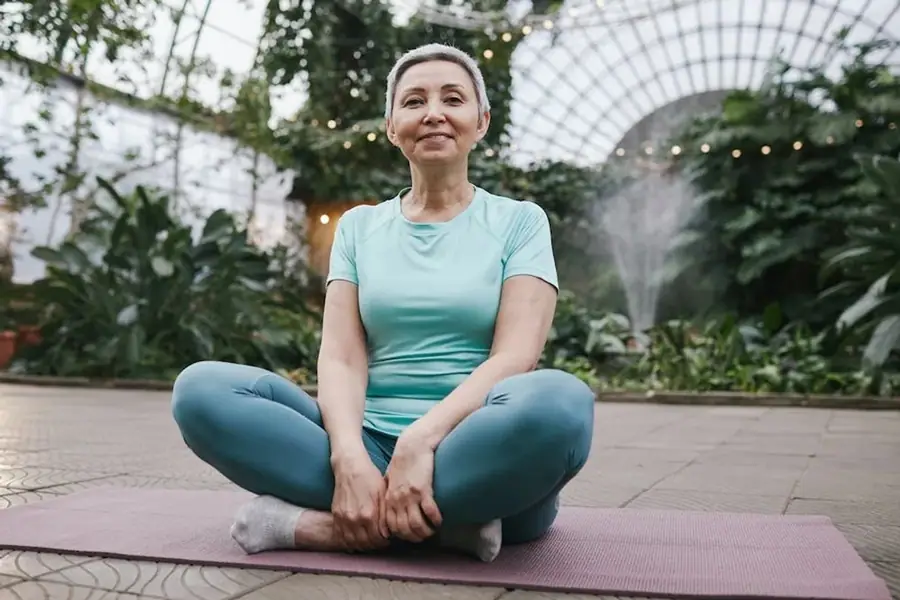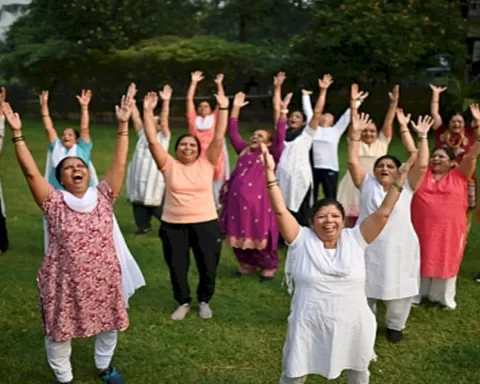New Delhi, November 09, 2023: One doctor has shared sit and stand test that could be an indicator of your life expectancy, while it’s impossible to predict your exact lifespan.
Speaking on the Today show, NBC News medical contributor Doctor Natalie Azar discussed the sit and stand test which could reveal the longevity of those aged 51 and 80.
The at-home examination, also known as sit-rising test (SRT), takes into consideration a number of factors, including heart health, balance, agility, core and leg strength and flexibility.
How to perform the SRT
To participate in the test, simply find a space on the floor that is comfortable to sit on. The next step requires you to get from standing to sitting cross-legged and then back to standing only using your legs and core to get up and down. Everyone starts the test with a score of 10 points. However, every time the following body parts are used for support, one point is taken off your score:
-
Hand
-
Knee
-
Forearm
-
One hand on knee or thigh
-
Side of leg
Dr Azar highlighted a study from 2012 which found that participants with a lower score were seven times more likely to die in the next six years. The referenced study, published by the European Society of Cardiology, involved 2,002 participants, of which 68 percent were men. Dr Azar said: “Eight points or higher is what you want. As we get older, we spend time talking cardiovascular health and aerobic fitness, but balance, flexibility and agility are also really important.”
Following the test, participants were assessed by researchers in the coming years and those who scored the fewest amount of points – zero to three – had up to a six times greater chance of dying than those in the highest scores – eight to 10. What’s more, around 40 percent of those in this range died within 11 years of the study. The study read: “Musculoskeletal fitness, as assessed by SRT, was a significant predictor of mortality in 51 to 80-year-old subjects.”
Study lead, Dr Claudio Gil Araújo, said: “When compared to other approaches to functional testing the sitting-rising test does not require specific equipment and is safe, easy to apply in a short time period (less than two minutes), and reliably scored. In our clinical practice, the test has been shown over the past ten years to be useful and practical for application to a large spectrum of populations, ranging from paediatric to geriatric.
“If a middle-aged or older man or woman can sit and rise from the floor using just one hand – or even better without the help of a hand – they are not only in the higher quartile of musculoskeletal fitness but their survival prognosis is probably better than that of those unable to do so.”
It’s important to note that people who scored lowest were older than those who scored highly. Dr Greg Hartley, associate professor at the University of Miami, pointed out that the test isn’t necessarily completely accurate. He added: “Frailty, strength, muscle mass, physical performance—those things are all correlated to mortality, but I would caution everybody that correlation doesn’t mean causation.”
Healthy ways to increase life expectancy
While genetics play an important part in life expectancy, environment factors – including diet and lifestyle – are key elements too. Here are some healthy habits which could help you live longer:
Daily exercise
Research has found a strong correlation between daily exercise to life expectancy. VeryWell Health references a review of studies in the Journal of Aging Research which showed that people who exercise regularly – even as little as three hours a week – lived up to 6.9 years longer than those who didn’t.
According to the NHS, adults aged between 19 to 64 should do at least 150 minutes of moderate intensity activity a week or 75 minutes of vigorous intensity activity a week. The health body recommends doing some type of physical activity every day, but exercising just once or twice a week can reduce the risk of heart disease or stroke.
Healthy diet
Studies have shown that eating a healthy diet, which is rich in vegetables, fruits, nuts, whole grains, healthy fats and omega-3 fatty acids can improve longevity. According to Health, a Mediterranean diet is considered the best for living longer and more healthfully.
The site writes: “This pattern is characterised by a high intake of fruits and vegetables; whole grains; pulses; healthful fats from nuts, olive oil, and avocado; and herbs and spices. It includes seafood a few times a week.” A study, published in the journal JAMA Internal Medicine, found that people who more carefully followed any of the healthy eating patterns were less likely to die from cancer, cardiovascular illness, and respiratory and neurodegenerative diseases.
Good sleep
While good sleep can improve your overall health, research has suggested that quality shut-eye may add years to people’s lives too. The Guardian pointed out a study which found that men who regularly sleep well could live almost five years longer than those who do not, while women could benefit by an additional two years.
Researchers also found that young people who had better sleep habits were less likely to die early. According to VeryWell Health, regularly sleeping for less than seven hours a night can have negative effects on the cardiovascular, endocrine, immune, and nervous systems.
The health site wrote: “Side effects of sleep deprivation can include obesity, diabetes, heart disease, hypertension, anxiety, depression, alcohol abuse, stroke, and increased risk of developing some types of cancer.”
Meanwhile, Healthline shared some lifestyle factors that can boost your health and may increase life expectancy, these include:
- Never smoking
- At least 30 minutes of daily physical activity
- Moderate alcohol intake – the NHS recommends not regularly drinking more than 14 units per week
- Maintaining a moderate weight (defined as a BMI less than 25)
- A good quality diet
Inputs with Mirror





